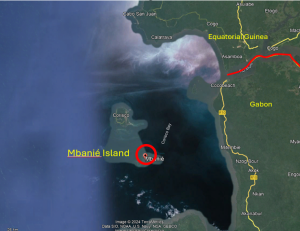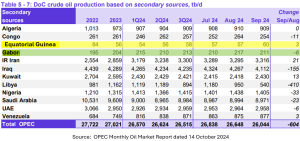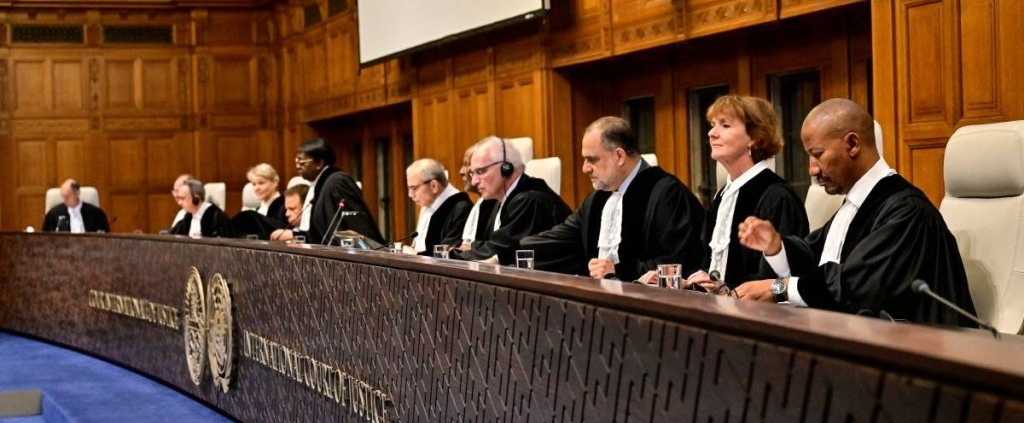Gulf of Guinea Neighbours Seek International Court of Justice Ruling
On Monday, 30 September 2024, Equatorial Guinea asked judges at the International Court of Justice (ICJ) in the Hague to reject Gabon’s claim to a group of islands in Corisco Bay, which straddles the international land border between the two countries. The island of Mbanié, with an area of just 74 acres, is the largest of three small islands that are the centre of the dispute. The dispute arose in 1972 when, following a military confrontation, Gabon ejected Equatorial Guinean troops and occupied the island, posting a small military garrison which remains to this day.

Following years of UN mediation, in 2016 both countries agreed to abide by the outcome of a dispute resolution process in the ICJ. Hearings concluded recently having begun in 2021.
Teams of legal experts representing the two nations contested the other’s claim based on the relevance of two historical treaties. Equatorial Guinea’s claim is based on a colonial era treaty signed in 1900 which divided French and Spanish colonial assets in West Africa. Gabon cites the 1974 Bata Convention to back its own claim, but Equatorial Guinea says the document Gabon has offered as proof for the 1974 agreement is unsigned and not an original. Equatorial Guinea’s Deputy Minister for Mines and Hydrocarbons, expressed frustration with Gabon’s claims, stating: “None of [the Equatorial Guinean delegation] had seen or heard of this supposed agreement… The document presented was not the original, but just an unauthenticated photocopy”. Marie-Madeleine Mborantsuo, honorary president of Gabon’s Constitutional Court, defended Gabon’s position, emphasizing that the 1974 Bata Convention had been sent to the French ambassador, which she argued was standard diplomatic practice. She urged the ICJ to recognize the validity of the document. The court will deliver a final and binding ruling in 2025.
What Is At Stake
Although both countries have significant oil and gas industries, the waters around the Mbanié island group are believed to have further valuable oil and gas reserves and for both countries the economic benefits of expanding their reserves would be politically and economically significant.
Enjoying investment and the injection of technical expertise, primarily from Mobil, Equatorial Guinea expanded its oil sector over several decades, becoming the third largest oil producer in Africa in 2005 with the second highest GDP per capita in the world. Equatorial Guinea now seeks to diversify its economy as a matter of urgency but, to avoid economic stagnation, it is important for the Obiang regime to continue to develop the oil sector. The demographics of the country have shifted though, and despite the wealth the oil sector has brought to the country, increasing urbanisation and rampant nepotism have driven increasing poverty among people not directly employed by oil and gas companies.
Gabon has enjoyed similarly impressive growth in its oil and gas sector. Prior to the 2011 formation of the national oil company, Société Nationale Petrolière Gabonaise, the country’s production was in the hands of international companies including Shell, Perenco, Total and Addax. By 2018, Gabon had overtaken its neighbour to become the third largest producer in Africa. By 2020, Gabon Oil had conducted a number of auctions of oil block licences. However, it will not start to see revenues from these blocks until 2025 at the earliest.

How is the ICJ Likely to Rule
The ICJ will rely on precedent to settle the dispute. However, there are two options they may adopt and the outcome is uncertain. They could rule that the international land border will be projected offshore on the same bearing as it follows at the point it meets the coast, or it might settle for extending the international maritime border perpendicular to the coastline. Just a few degrees of orientation will have massive territorial implications for both countries, so although they have both agreed to abide by the ruling, one or other is likely to be dissatisfied with the outcome. Equatorial Guinea and Gabon have both emphasized the peaceful nature of their dispute, with officials from both countries expressing hope that the International Court of Justice (ICJ) ruling will finally resolve the decades-long territorial disagreement. It is expected that both will respect the court’s decision – in the short term at least.
The International Dimension
International interest in the region is growing. China is courting both countries with the aim of establishing a strategic naval base for the Chinese Navy in the Gulf of Guinea. Washington is concerned by this, although they have not yet issued any formal statement or comment, and is using its economic and diplomatic power to lobby both governments against offering basing rights to China.
Economically, Western IOCs have significant investment in the region. The decision of the ICJ will potentially determine the viability of future investment or even continuation operations by some of these companies.
The risk of armed conflict is low, but in the event of hostilities, Gabon enjoys a numerical advantage over its neighbour onshore. However, the Equatorial Guinean Navy is stronger than its Gabonese counterpart. Any conflict is likely to be short lived and localised but could disrupt the region’s current strategic balance and drive one or other country to rapidly reach a decision about basing rights for foreign navies.
We will of course keep monitoring this situation and provide updates over the coming months in this ongoing story.


